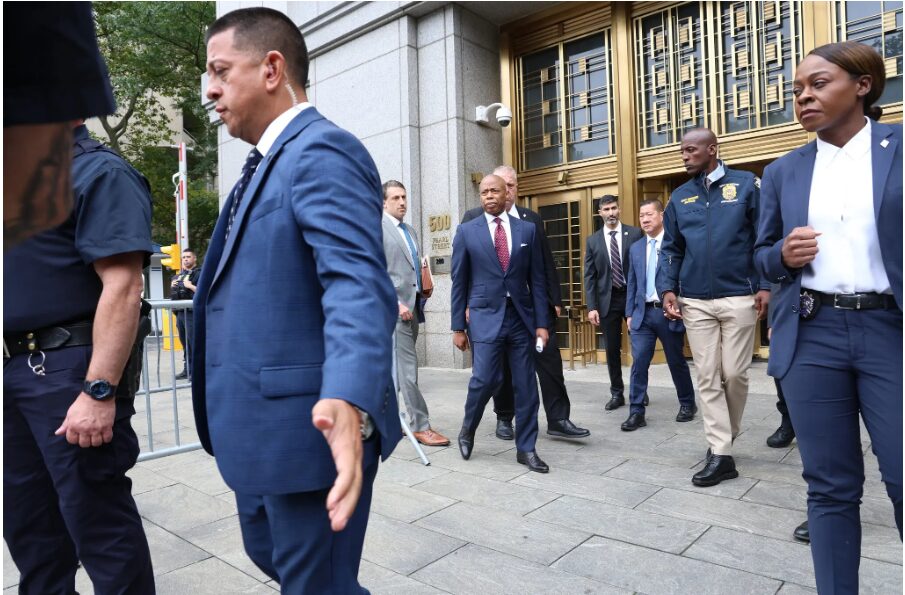New York City is experiencing a significant political shift as Mayor Eric Adams faces a series of serious legal challenges, including allegations of bribery and improper campaign contributions. These developments have sparked concern within the city’s business community, which had initially felt optimistic about Adams’s pro-business stance following years of progressive policies under former Mayor Bill de Blasio.
Adams’s Rise to Office and Initial Support from Businesses
When Eric Adams took office, the business sector in New York City expressed relief. For eight years, business leaders had criticized de Blasio’s liberal ideology, which they felt hampered economic growth. Adams, in stark contrast, often championed the importance of wealthy taxpayers and the role of businesses in providing good jobs for middle-class residents. His administration presented a vision that resonated with the business elite, particularly by referencing the city’s strong bond rating as a hallmark of his governance.
This alignment was particularly evident in the early days of his tenure. Notably, Adams maintained a close relationship with former Mayor Michael Bloomberg, who endorsed him during the election. In one of his first public statements after winning the Democratic primary, Adams declared, “New York will no longer be anti-business,” signaling a new era for the city’s economic policy.
Indictments and Growing Concerns
However, the atmosphere has since darkened with the announcement of federal investigations into Adams’s administration. Recently, investigators seized the phones of his chief adviser, Ingrid Lewis-Martin, and issued a grand jury subpoena for her testimony. While Lewis-Martin has publicly denied any wrongdoing and pledged cooperation, the unfolding legal situation casts a long shadow over the administration.
The indictment has led many in the business community to hesitate. Organizations that once stood firmly behind Adams are now voicing concerns. The Real Estate Board of New York, a powerful lobbying group, and District Council 37, the city’s largest public employee union, have both refrained from commenting on the charges against the mayor. Their silence reflects a growing anxiety about the future of the city’s governance and economic policies.
Business Community’s Reaction
In light of the ongoing investigations, business leaders are left with uncertainty as they consider their options for the upcoming election. Currently, four candidates have declared their intention to run for mayor, all of whom are seen as left of Adams. This shift raises fears that a progressive successor may not prioritize the business-friendly policies that many in the sector have come to rely on.
Julie Samuels, president of TechNyc
A trade group representing a variety of tech companies, expressed her concern about the lack of confidence in the current crop of candidates. “Most of them don’t even know who a lot of these candidates are,” she noted, highlighting a significant disconnect between the business community and potential political alternatives.
Adams’s policies have aimed to address pressing issues, such as public safety and homelessness, which business leaders view as essential to maintaining a thriving economic environment. By employing measures like increasing police presence in crime-ridden areas and clearing homeless encampments, Adams sought to create a sense of order that appeals to the business community. However, these measures have also drawn criticism from progressive activists who argue that they do not adequately address the systemic issues facing the city.
Divided Opinions and Future Prospects
Critics, like Olivia Leirer from New York Communities for Change, argue that Adams’s approach aligns too closely with real estate interests and fails to offer real solutions for issues like affordable housing and youth programs. “The business community may be happy that Eric Adams is sweeping all of the homeless people off our streets,” Leirer stated, “but people who care about our communities know that housing and programs for youth are what actually support our communities and bring crime down in the long run.”
Nicole Gelinas, a senior fellow at the Manhattan Institute, noted that while some business leaders have expressed disappointment in Adams’s handling of the influx of migrants and other challenges, they remain wary of potential alternatives. Under Adams, New York City regained nearly one million private sector jobs lost during the pandemic, a significant accomplishment that many hope to maintain.
Yet, the ongoing investigations could jeopardize some of Adams’s signature policies, including the City of Yes zoning amendments, which aim to address the city’s housing shortage. The City Planning Commission has approved a version of these proposals, but uncertainties surrounding the mayor’s future could complicate their implementation.
Conclusion: A Mayor Defiant Amidst Challenges
In a recent press conference, Adams defiantly stated, “I’m the mayor of the City of New York,” as he vowed to continue serving despite facing serious criminal charges. The mayor’s commitment to his role suggests that he intends to push forward with his policies, at least for now.
